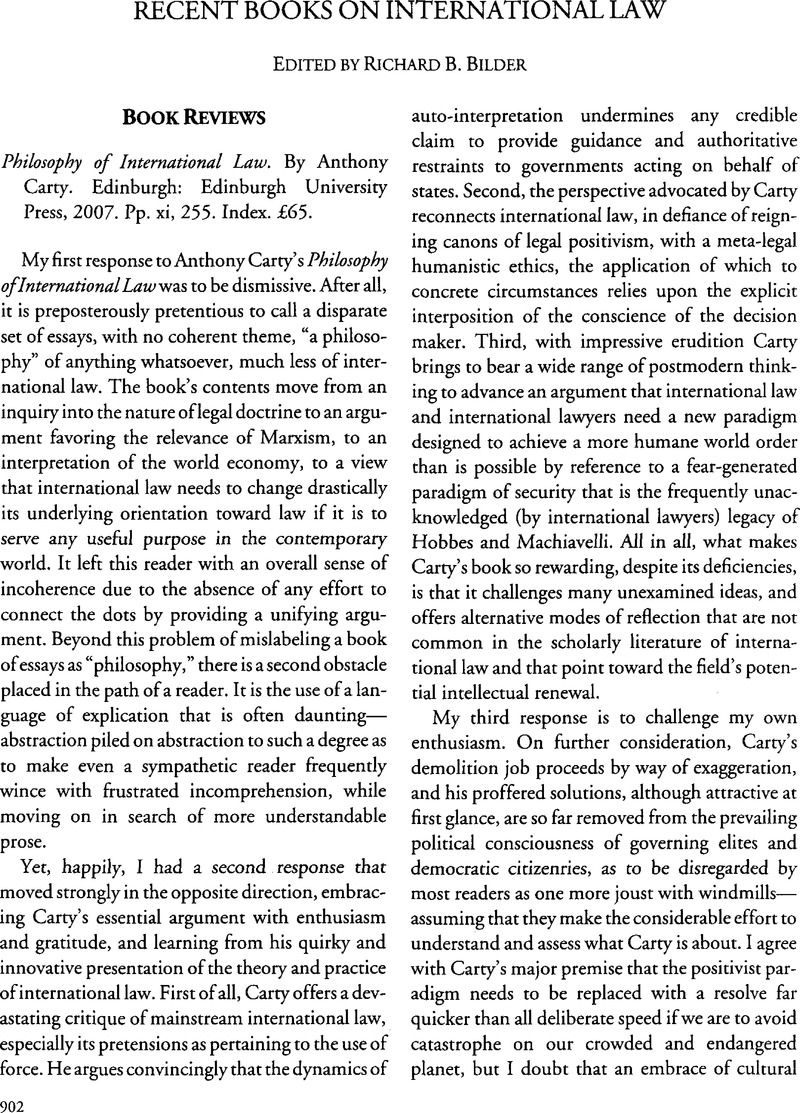No CrossRef data available.
Article contents
Philosophy of International Law. By Anthony Carty. Edinburgh: Edinburgh University Press, 2007. Pp. xi, 255. Index. £65.
Published online by Cambridge University Press: 27 February 2017
Abstract

- Type
- Recent Books on International Law
- Information
- Copyright
- Copyright © American Society of International Law 2008
References
1 See Philippe Sands, Lawless World: America and The Making and Breaking of Global Rules from Fdr’s Atlantic Charter to George W. Bush’s Illegal War (2005); Marjorie Cohn, Cowboy Republic: Six Ways The Bush Gang has Defied The Law (2007); David Cole & Jules Lobel, Less Safe Less Free: Why America is Losing The War on Terror (2007).
2 With implied irony, Jack Goldsmith writes of the approach taken by the Bush presidency to the role of law and lawyers in the war on terror: “[N]ever before in the history of the United States had lawyers had such extraordinary influence over war policy as they did after 9/n.” Jack, Goldsmith The Terror Presidency: Law and Judgment Inside The Bush Administration 129–30 (2007)Google Scholar (reviewed by Peter Raven-Hansen at 102 AJIL 672 (2008)).
3 This reading of international law and modernity should be contrasted with the important presentation of this progression of ideas from premodern to modern offered by Richard, Tuck The Rights Of War And Peace: Political Thought And The International Order From Grotius To Kant (1999).Google Scholar
4 Authoritatively set forth in Raymond, Aron Peace And War: A Theory Of International Relations (1966).Google Scholar
5 Tuck interestingly argues that the entire raison d’état literature presupposes the implicit authorization of preemptive war in response to fear and perceived threat. TUCK, supra note 3, at 11, 34–40.
6 Richard, N. Gardner Neither Bush nor the ‘Juris-prudes , ‘97 AJIL 585 (2003).Google Scholar
7 Martti, Koskenniemi From Apology To Utopia: The Structure Of International Legal Argument (1989).Google Scholar
8 David Kennedy, Of War And Law (2006).
9 See Carty’s Review Essay: Theory of lor Theory Instead of I International Law , 8 Eur. J. Int’l L. 181 (1997).Google Scholar
10 This critique has been most influentially developed by Edward Said, Orientalism (1978)].
11 Well depicted in Walter Russell, Mead Power, Terror, Peace And War: America’s Grand Strategy In A World At Risk (2004)Google Scholar; but see John, Lewis Gaddis Surprise, Security, and The American Experience Google Scholar, which Carty see as sensitive to the dangers of American hubris in unipolar world.
12 I have considered these issues in Richard Falk, Religion And Humane Global Governance (2001). By “civilization identity” is meant the distinctive beliefs and values, generally found in regionally dominant religions and cultural artifacts, that inform the outlook of persons so self-identified.




